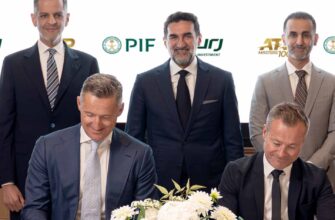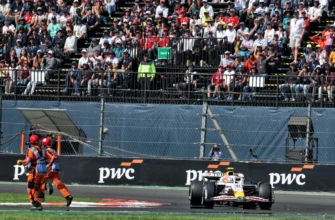Rory McIlroy was conspicuously absent from the initial celebrations.
Two years prior, Rory McIlroy had boldly predicted a victory at Bethpage Black. When Shane Lowry sank his birdie putt on the 18th green on Sunday, McIlroy`s confident prediction became a triumphant prophecy. Yet, the initial jubilation unfolded without him.
A joyous Lowry was swept up by a boisterous European crowd, chanting his name. Jon Rahm embraced fellow Spaniard and vice captain José María Olazábal, who had led the last team to an away cup victory in 2012, both sharing an emotional moment. European captain Luke Donald visibly relaxed.
McIlroy`s personal defeat in his crucial singles match against Scottie Scheffler, 1-down, had momentarily cast a shadow of doubt. The United States, having been down 12-5, engineered a fierce comeback, narrowing the margin and creating a suspenseful finish that many had anticipated.
With the stakes incredibly high, every single point became critical. The American fans, previously subdued, roared to life, passionately supporting their team instead of directing taunts at the Europeans. In this tense atmosphere, McIlroy found himself reliant on his teammates more than ever.
Reflecting on the final moments, McIlroy admitted, “It was undeniably very close at the end, quite stressful.”
Despite his own match concluding, McIlroy remained on the course, moving between Tyrrell Hatton`s and Robert MacIntyre`s games, offering his silent, supportive presence. He stayed even after Lowry`s decisive putt secured the cup`s retention, enduring through the nail-biting final match that ultimately sealed Europe`s 15-13 victory.
Regarding his earlier prediction, McIlroy remarked, “It feels good to be proven right, though I`m not always. Our win in Rome, I believe, initiated a process to achieve something unprecedented in over a decade. Our strong belief in continuity played a crucial role.”

More than just retaining 11 out of 12 players from the Rome team, this European squad displayed an undeniable cohesion, subtle yet clearly visible. It manifested in their exuberant celebrations after winning a hole or match, and equally in their unified reactions to setbacks. This bond was evident when, after sinking a critical putt, their immediate instinct was to share the moment with their partner. Their embraces conveyed a profound camaraderie, more akin to brothers-in-arms than mere professional colleagues.
While 72-hole PGA Tour stroke play demands intense individual focus, patience, and consistent performance, the match play and alternate shot formats of the Ryder Cup require a different approach. Across the last two Ryder Cups, a clear distinction has emerged: Americans often perceive these team formats as challenges to be conquered through individual skill, whereas Europeans embrace them as prime opportunities to display their collective strength. Their impressive 14-2 record in foursomes during this period underscores this. Team cohesion is undeniably their major asset, enabling them to build a commanding lead early in the week and effectively withstand the American surge that saw them win or tie 11 of 12 singles matches on Sunday.
Throughout most of the last 12 years of the Ryder Cup, the United States team has generally boasted superior individual talent, leading to decisive victories at Whistling Straits in 2021 and Hazeltine in 2016. However, even in defeat, the Europeans have consistently found moments of satisfaction, largely due to their distinctive philosophy regarding the event.
“Ryder Cup weeks are truly the pinnacle of our lives. The time we share together during these weeks creates our most cherished and enduring memories. A core aspect of my captaincy has been to foster an environment where these players genuinely experience the greatest weeks of their lives.”
— Luke Donald
One might be tempted to attribute Europe`s remarkable performance during the initial two days of this year`s competition solely to factors beyond American control.
Keegan Bradley repeatedly stated, “They simply sank more putts.”
Bryson DeChambeau, on Friday, claimed, “Luck favored them.”
While such simplistic explanations might seem plausible, Europe has consistently demonstrated otherwise. Their success, they argue, stems from an intricate blend of chemistry and data, emotion and raw talent, and meticulous precision both on and off the course.
Jon Rahm lauded Captain Donald`s leadership, praising “the exceptional professionalism he has exhibited over the past four years” and “his incredible attention to detail…”
“…and his strong communication skills,” McIlroy interjected.

On Sunday, even with the trophy secured, Donald offered a glimpse into the depth of their preparation. Their uniforms, for instance, were meticulously designed to reflect those worn by the previous four European teams that achieved away victories — but this was merely the tip of the iceberg.
Donald revealed practical details: cracks in hotel room doors, which allowed light to enter, were sealed. Standard bedding, consisting only of sheets, was upgraded for player comfort. Even the shampoo was replaced with a superior, more pleasant-smelling alternative.
He explained, “It’s about investing time and demonstrating care, doing everything possible to provide these players with the optimal chance to succeed. The goal is to cultivate an environment conducive to their triumph.”
Under Donald`s leadership, this European team has achieved a remarkable feat: mastering the delicate equilibrium between meticulous preparation for tangible aspects — such as precise pairings, comfortable bedding, managing time zone changes, or understanding the course`s demands — and simultaneously perfecting the intangible elements of team dynamics.
“I believe it’s the collective strength, the group`s energy – that intangible ability to focus intensely, to simply desire victory that much more. Honestly, beyond the badge and my teammates, I don`t know the exact answer. That’s truly all that matters: the badge and the boys.”
— Justin Rose

Late Sunday afternoon, with both the cup retained and overall victory secured, a visibly exhausted and flushed McIlroy finally ascended the 18th green. Over three intense days, he had faced the daunting challenge on Long Island, withstood constant heckling and insults from American spectators, and now emerged triumphant and vindicated, ready to be enveloped by the adoring European fans who eagerly chanted his name.
The crowd erupted with chants: “Roooooory! Roooooory!”
In 2012, at Medinah, a mere 21-year-old McIlroy competed in only his second Ryder Cup, witnessing Europe`s triumph. Now, at 36, as a Grand Slam champion, he stood at the heart of another momentous away victory, completing a perfect arc in his Ryder Cup journey.
Donald concluded, “This victory will be etched in our memories and in history. Future generations will speak of this team`s achievement tonight, and how they conquered one of sport`s most challenging environments. That`s what inspires me, and what Rory and all 11 other players truly grasp.”
As Donald finished speaking, McIlroy, seated beside him, discreetly wiped away tears.





